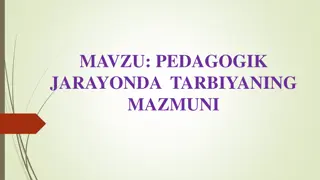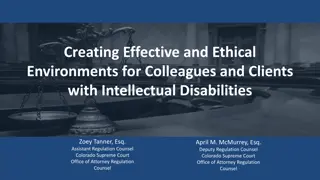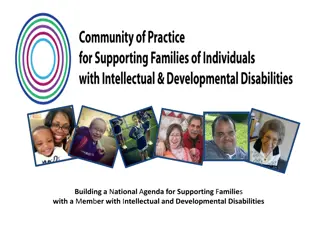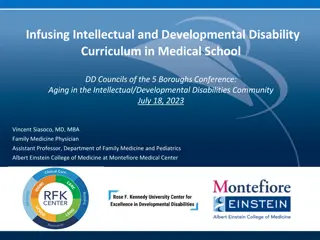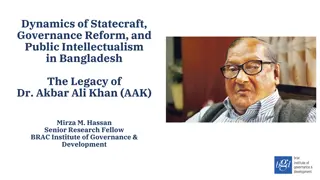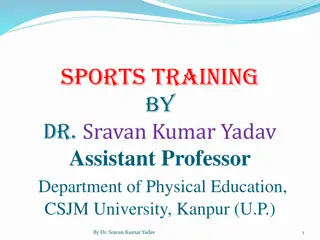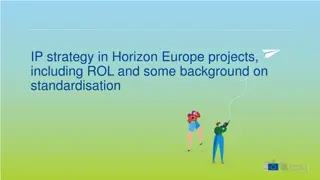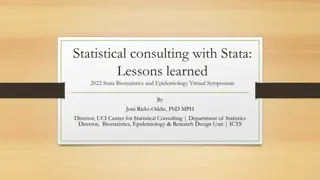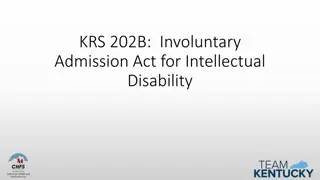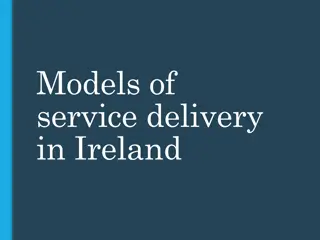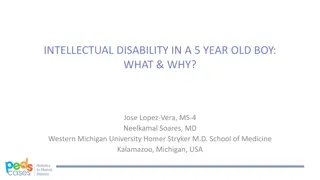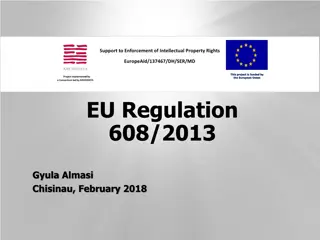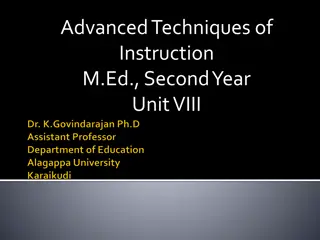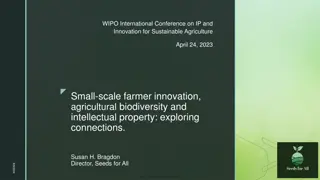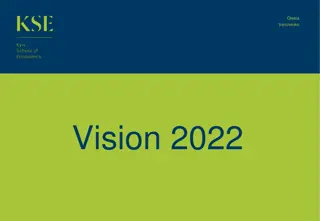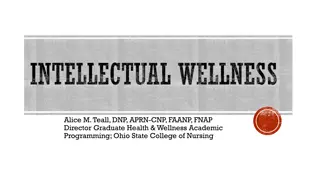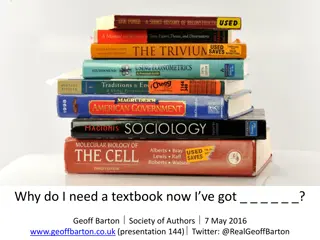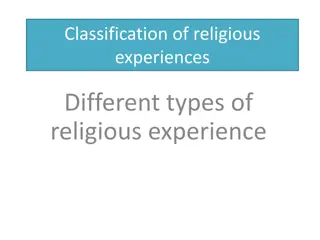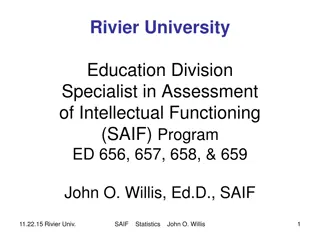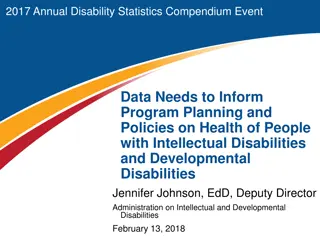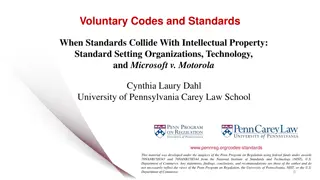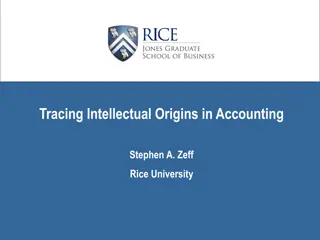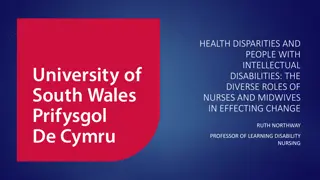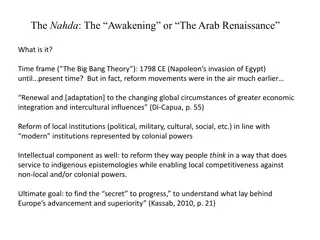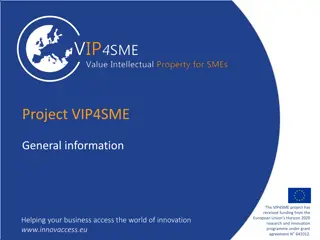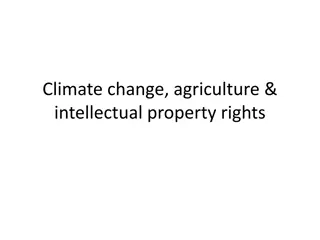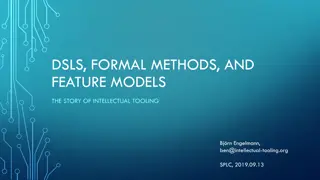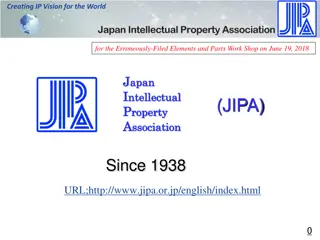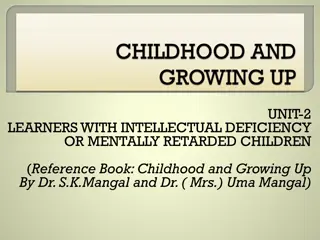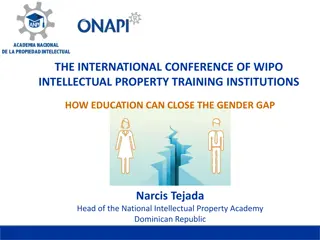Intellectual Property Rights and Technology Business Management Courses
Explore post-graduate and certificate courses on Intellectual Property Rights and Technology Business Management offered by renowned professors and industry experts. Learn about patents, technology transfer, creativity, and innovation. Various pricing options available for corporate, students, facul
1 views • 7 slides
Fundamental Principles of Educational Process
Educational process in pedagogy focuses on nurturing individuals to become well-rounded, mature, and responsible members of society. It encompasses intellectual, moral, social, and economic development through fostering critical thinking, communication skills, values, and work ethics. The key compon
1 views • 15 slides
Creating Effective and Ethical Environments for Colleagues and Clients with Intellectual Disabilities
Enhance inclusivity and professionalism in legal practice through creating environments that support colleagues and clients with intellectual disabilities. Uphold ethical standards, promote diversity, and ensure access to justice for all individuals. Commit to upholding the Colorado Attorney Oath of
0 views • 31 slides
Building a National Agenda for Supporting Families with Intellectual and Developmental Disabilities
This initiative aims to create a model framework for supporting families with a member who has intellectual or developmental disabilities across their lifespan. The project involves a community of practice focusing on various aspects such as family connections, employment, healthy living, housing su
5 views • 28 slides
Understanding Mental Deficiency: Causes and Classifications
Mental deficiency, also known as intellectual disability, is characterized by significantly below-average intellectual functioning before the age of 18, along with limitations in adaptive behaviors. It is measured using standardized IQ tests, with classifications ranging from profound to mild. Two m
3 views • 65 slides
Infusing Intellectual and Developmental Disability Curriculum in Medical School
This presentation highlights the integration of an Intellectual and Developmental Disability (IDD) curriculum in medical schools, emphasizing the importance of addressing healthcare disparities. The curriculum evolution, including grants and remote implementations due to the COVID-19 pandemic, is di
6 views • 6 slides
Dynamics of Statecraft and Public Intellectualism: The AAK Legacy
Dr. Akbar Ali Khan, a notable figure in Bangladesh, made significant contributions to statecraft, governance reform, and public intellectualism. His oeuvre encompassed topics such as economics, politics, society, rule of law, bureaucracy, and more. AAK's role as a public intellectual involved contex
0 views • 15 slides
Understanding Sports Training: A Comprehensive Overview by Dr. Sravan Kumar Yadav
Sports training is a crucial process aimed at enhancing physical, psychological, and intellectual capabilities to improve performance. Dr. Sravan Kumar Yadav delves into the meaning, definitions, aims, and objectives of sports training, shedding light on its systematic and educational nature. Throug
0 views • 17 slides
Intellectual Property Management in Horizon Europe Projects
Horizon Europe projects require beneficiaries to implement comprehensive strategies for managing intellectual property. This includes protecting and exploiting project results, providing a Results Ownership List (ROL), and considering freedom to operate and publication vs. IP protection balance. Fai
0 views • 10 slides
Analyzing Trends in Student Placement for Autism and Intellectual Disability in California
Explore the project's goal of examining trends and factors influencing the placement of students with autism and intellectual disability in California over a 5-year period. Data obtained from the California Department of Education underwent complex data organization to build an analyzable dataset. M
1 views • 24 slides
Understanding Kentucky's KRS.202B Involuntary Admission Act for Intellectual Disability
Kentucky's KRS.202B allows for the involuntary admission of individuals with intellectual disabilities to Intermediate Care Facilities for Individuals with Intellectual Disability (ICF/IID). The process involves filing a petition in district court, evaluation by two certified evaluators, and coordin
0 views • 25 slides
Evolution of Service Delivery Models for Intellectual Disabilities in Ireland
Residential services for individuals with intellectual disabilities in Ireland have evolved over the years, transitioning from congregated settings to group homes and independent arrangements. This shift has seen a decrease in residents in congregated settings with a rise in those living in group ho
0 views • 30 slides
Exploring Spiritual Pathways: Relational and Intellectual Journeys
Journey through the Relational and Intellectual Pathways of spirituality, where connections with others and engagement of the mind lead to profound spiritual growth and closeness to the divine. Discover how different individuals connect with God through relationships and intellectual pursuits, enric
0 views • 11 slides
Developmental Disability Eligibility Reform Amendment Act of 2022 Overview
The Developmental Disability Eligibility Reform Amendment Act of 2022 introduces new definitions, eligibility criteria, and expands services for individuals with developmental disabilities. It defines intellectual disability, developmental disability, and introduces substantial functional limitation
3 views • 13 slides
Understanding Intellectual Disability in a 5-Year-Old Boy
This case study discusses the diagnosis and severity of intellectual disability (ID) in a 5-year-old boy, distinguishing between developmental delay and ID. It covers the importance of genetic testing, particularly in cases like Fragile X syndrome, as well as the evolution of assessing ID severity b
0 views • 21 slides
Enhancing Support for Individuals with Intellectual Disabilities and Special Needs
In order to better the environment and improve the self-reliance and dignity of individuals with intellectual disabilities and special needs, community support, tools, and resources are essential for them to lead independent and productive lives. The mission focuses on providing services like home a
0 views • 19 slides
Enhancing Customs Enforcement for Intellectual Property Rights Protection
This project, funded by the European Union, highlights the role of customs in enforcing intellectual property rights (IPR) regulations. It covers new EU and national regulations, outlining procedures for identifying and handling goods suspected of infringing IPR. Major changes include shorter proced
0 views • 38 slides
Understanding Learning Theories in Instructional Design
Learning is defined as enduring behavior change resulting from experiences. Behaviorism, Cognitivism, and Constructivism are key theories in instructional design. Teachers must cater to learners' needs for effective behavior changes. Empiricism and rationalism have historically influenced epistemolo
2 views • 30 slides
Small-Scale Farmer Innovation and Agricultural Biodiversity in the Context of Intellectual Property
Discussions at the WIPO International Conference on IP and Innovation for Sustainable Agriculture highlighted the crucial role of small-scale farmers in managing and developing agricultural biodiversity, which is essential for sustainable agricultural production and global food security. The session
1 views • 12 slides
KSE Vision 2022: Building Intellectual Capacity for Economic Growth in Ukraine
KSE's vision for 2022 focuses on nurturing intellectual capacity to strengthen Ukraine's economy and position in the global market. Their role is to invigorate growth, produce high-quality research, and drive economic and public policy reforms through a diverse academic portfolio. By establishing va
0 views • 8 slides
Enhancing Your Intellectual Wellness: Tips and Benefits
Understanding and promoting intellectual wellness is crucial for lifelong learning, critical thinking, and personal growth. This article presents insights into intellectual wellness, its importance, signs of being intellectually unwell, steps to improve it, and engaging challenges to boost your cogn
0 views • 8 slides
The Importance of Textbooks and Intellectual Capital in Education
The value of textbooks in education is highlighted through discussions on intellectual capital, language limits, habits formation, and the Matthew Effect. The interplay between knowledge acquisition, language proficiency, and foundational skills like reading lays the groundwork for future success in
0 views • 69 slides
Study of Different Types of Religious Experiences and Visions
This content discusses the classification and nature of religious experiences, focusing on visions, conversion, mysticism, and prayer. Various forms of visions, including sensory, intellectual, and dreams, are explored along with examples such as Joan of Arc. The different types of visions are detai
0 views • 33 slides
SAIF Program at Rivier University: Assessment of Intellectual Functioning
Rivier University's Education Division offers the Specialist in Assessment of Intellectual Functioning (SAIF) Program led by John O. Willis, Ed.D. The program involves courses ED.656, .657, .658, and .659 focusing on statistics, test scores, measurement, and psychometrics. Resources from experts lik
0 views • 92 slides
Understanding the Health Disparities in People with Intellectual and Developmental Disabilities
The article highlights the pressing need for better information and updated prevalence rates to inform program planning and policies on the health of individuals with intellectual and developmental disabilities (ID/DD). It discusses the challenges in understanding the health-related needs of this po
0 views • 28 slides
Yale Undergraduate Survey on Free Speech and Intellectual Diversity
A survey conducted among 872 Yale undergraduate students in April 2017 by McLaughlin & Associates aimed to gauge opinions on Yale's efforts in promoting intellectual diversity and free speech. Results show varying levels of approval/disapproval across different demographics, including class standing
0 views • 30 slides
Understanding the Intersection of Standards, Intellectual Property, and Market Dynamics in the Microsoft v. Motorola Case
This text explores the clash between voluntary standards, intellectual property rights, and market influences, using the case of Microsoft v. Motorola as a focal point. It delves into the complexities of standard setting, FRAND agreements, and the challenges surrounding fair licensing terms. The par
0 views • 14 slides
Understanding Intellectual Freedom in American Society
Explore the concept of intellectual freedom as a core value in American society, emphasizing the importance of liberty, democracy, and the exchange of ideas. Academic and intellectual freedom are crucial for the advancement of knowledge and the functioning of a democratic society, allowing individua
0 views • 45 slides
Understanding Neurodevelopmental Disorders in Childhood and Adolescence
Neurodevelopmental disorders in childhood and adolescence encompass a range of conditions including intellectual disabilities, communication disorders, autism spectrum disorder, and attention deficit/hyperactivity disorder. These disorders impact cognitive development, adaptive functioning, and comm
0 views • 30 slides
Tracing Intellectual Origins in Accounting: A Journey of Thought Evolution
Tracing the intellectual origins in accounting reveals the roots and influences behind current theories and practices. This process involves connecting the dots across decades to understand the intellectual baggage inherited from the past. Different streams of thought in US accounting literature, st
0 views • 41 slides
Addressing Health Disparities in People with Intellectual Disabilities: Roles of Nurses and Midwives
People with intellectual disabilities face significant health disparities, including multiple long-term health conditions and higher mortality rates. Nurses and midwives play diverse roles in addressing these disparities through research and inclusive practices. Common conditions include epilepsy, o
0 views • 20 slides
Emerging Trends in Arab Renaissance and the Evolution of Arabic Literature
The Nahda, or Arab Renaissance, initiated in the late 18th century, marked a period of reform and adaptation in Arab societies, aiming to align with modern institutions and promote intellectual advancement. This movement sought to embrace progress, foster rationality, and understand civilization's r
0 views • 5 slides
VIP4SME Project - Enhancing Intellectual Property Support Services for SMEs
The VIP4SME project, funded by the European Union's Horizon 2020 program, aims to raise awareness among Small, Medium, and Micro Enterprises (SMEs) about the value of intellectual capital and enhance Intellectual Property (IP) support services. With a consortium of partners across Europe, the projec
0 views • 6 slides
Challenges at the Intersection of Climate Change, Agriculture, and Intellectual Property Rights
The impacts of climate change on agriculture and the implications for intellectual property rights are explored in this content. Extreme weather events and rising temperatures are creating challenges for farmers, particularly those in developing countries who rely on subsistence agriculture. The eco
0 views • 47 slides
Intellectual Property in Plant Biotechnology: Importance, Protection, and Implications
Understanding the significance of intellectual property in plant biotechnology is vital for innovation and development. It involves protecting creations of the mind like inventions, designs, and symbols to incentivize research and reward inventors. Milestones in intellectual property protection, mea
0 views • 11 slides
Evolution of Tooling: From Physical to Digital Intellectual Enhancements
Delve into the evolution of tooling from physical implements like spears and hammers to digital intellectual enhancements through software engineering, DSLS, and MDSD. Explore the progression of tools from mere physical aids to sophisticated intellectual aids that augment human abilities in communic
0 views • 42 slides
Japanese Intellectual Property Association: Promoting Innovation and Progress
Japanese Intellectual Property Association (JIPA) has been assisting in the appropriate use of intellectual property systems and contributing to member corporations' business opportunities since 1938. With over 1300 supporting members, JIPA aims to promote the sound progress of technology and Japane
0 views • 12 slides
Understanding Learners with Intellectual Deficiency
Individuals with intellectual deficiency or mental retardation may exhibit immature behaviors, lack judgment, and show signs of delayed development. They require special care, early diagnosis, parental assistance, and educational support to reach a reasonable degree of educational achievement and so
0 views • 7 slides
Addressing Gender Disparities in Intellectual Property Education
The National Intellectual Property Academy in the Dominican Republic collaborated with WIPO to bridge the gender gap through various training initiatives. The academy trained professionals to become trainers, resulting in a total of 554 training activities and 16,969 participants over the years. Tar
0 views • 23 slides
Understanding Mental Disorders in Intellectual Disability: Insights and Challenges
Explore the complexities of mental disorders in individuals with intellectual disability, focusing on diagnostic difficulties, prevalence rates, and differences in clinical presentation. Delve into the interaction between intellectual disability, physical health, and mental illness, shedding light o
0 views • 46 slides

